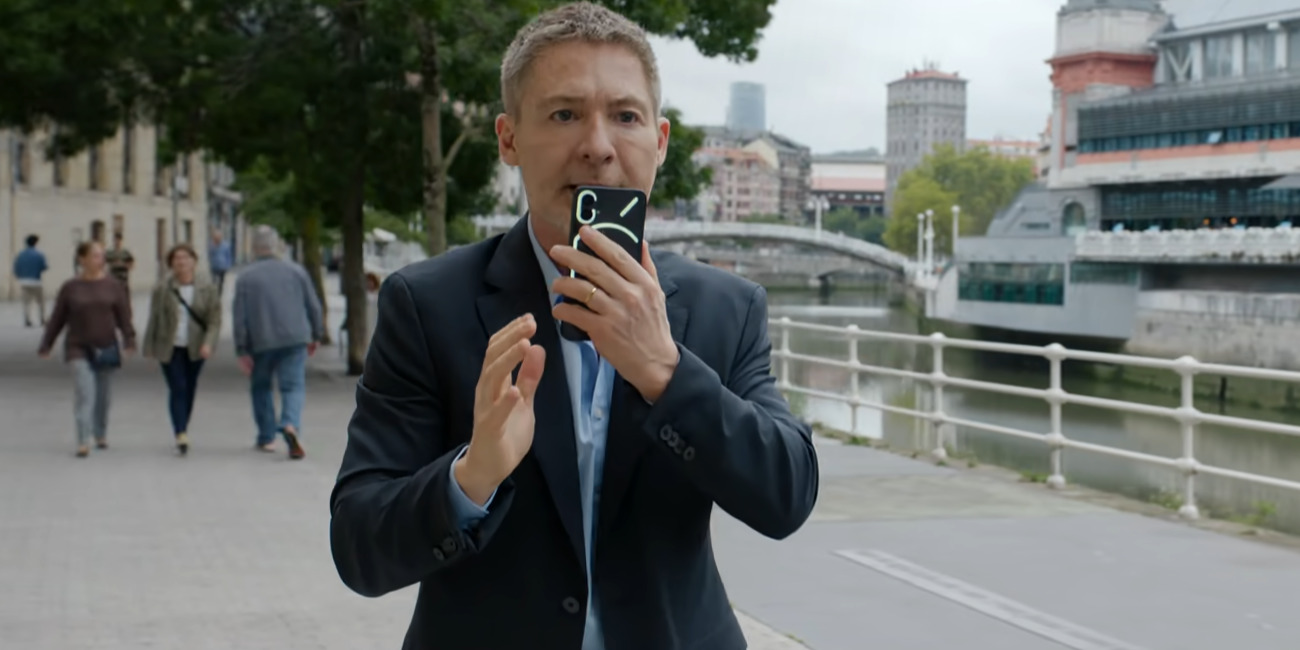‘I Can’t Live Without You’ is a Spanish comedy film directed by Santiago Requejo that reflects on the concerningly obsessive relationship between a person and their cell phone. Equipping a work-obsessed Carlos Mendoza at the narrative’s center, the story follows his tumultuous marriage with Adela, who is tired of her husband’s reliability on his digital devices. Therefore, after watching his fixation grow over the years, Carlos’ wife decides to call it quits, forcing him to take his problem seriously. Nevertheless, despite applying to a detox therapy program, his reliance on his phone persists due to his demanding job.
Thus, torn between his own impulses and saving his marriage, Carlos finds himself trying to conquer a crossroads. Even though the film bathes its storylines in a comedic light, the heart of the plot remains rooted in relatability. Therefore, viewers may wonder if the protagonist’s experiences have any basis in reality.
I Can’t Live Without You Examines the Pervasive Issue of Phone Addiction
‘I Can’t Live Without You,’ originally titled ‘No Puedo Vivir Sin ti,’ charts an entertaining story scrutinizing a global problem of phone addiction within a comedic context. However, even though the film’s approach to depicting Carlos’ struggle with smartphone addiction remains relatable, the story itself isn’t based on any specific real-life instances. Instead, it fabricates fictional events surrounding fictional characters without any direct counterparts in real life. Even so, Carlos’ story remains reminiscent of reality in notable thematic ways.

The workaholic businessman’s storyline centers around his addiction to his phone. As such, every aspect of his life—from personal relationships to professional commitments—sports ties with his incessant need to consistently check up on his devices. While the same is oftentimes played up for laughs, it portrays a realistic underlying psychological problem relevant to modern culture: Nomophobia. The psychological condition of Nomophobia, or NO MObile PHone PhoBIA, is the fear of phone detachment. The most prominent signs of a person experiencing symptoms of this condition manifest as anxiety, particularly in the event that one misplaces their phone or runs out of their device’s battery life.

As per research conducted in the early 2010s, 84% of people were unable to go even one day without their phones. A decade later, as people’s lives steadily shifted to rely more and more on their phones, the gravity of the condition only increased. Therefore, despite the exaggerated depiction of Carlos’ addiction to his phone and the absurdist detoxing process that follows, his story retains a realistic struggle at its core. For the same reason, many viewers may be able to relate to Carlos’ on-screen experiences. Yet, the character and his narrative are rendered fictitious in nature.
The Film Emphasizes the Importance of Family
While Carlos’ phone addiction is the central nucleus that holds the narrative together, the character’s relationships with his family also form a crucial cornerstone of his experiences. The central conflict within the storyline emerges when his family grows tired of his neglect and decides to cut him out of their lives. As his obsession grows, he begins to deprioritize his family—either through remaining distracted by his phone or missing instrumental moments in favor of waiting in line for the newest Daiafon model launch. For the same reason, once his kids leave home for college, Adela decides to divorce him and start her life anew.

Despite his previous actions, Adela’s decision moves Carlos into action as he realizes he has to change himself if he wants to save his drowning marriage. Thus, his efforts that follow—attending a therapy program to recover from his phone addiction and finally quitting his burdensome job—reflect his love and devotion toward his family. As such, the character’s primary motivation throughout the story remains universally relatable and compelling, allowing viewers to connect with him even in his more unlikable moments. Ultimately, the film plays into its genre conventions, equipping tropes and cliches to narrate a chaotic story. Still, despite its fictional origins, it manages to find a slight footing in reality.
Read More: Are Daiafon 17 and 18 Real Phones? Is La Terapia de Rosa a Real Therapy Program?


You must be logged in to post a comment.